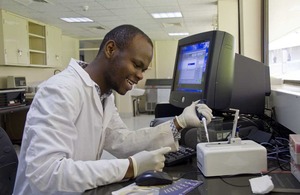DFID Research: Improving the quality and scope of research coverage in Africa
DFID launch Development Research Uptake in Sub-Saharan Africa (DRUSSA) as the need for an African science news service increases.

An MSc student at Kenyatta University (a university participating in the DRUSSA programme). Geoffrey Mugambi works with ICRISAT-Nairobi on the use of molecular markers in agriculture to help breeding programs, 2010. Picture: Swathi Sridharan/ ICRISAT
If you read local newspapers in many African countries, it is highly likely that most of the cutting edge research stories you read are not even about Africa nor are they written for Africans. This is a perplexing state of affairs if you consider the rich research undertaken in Africa every year. Where is this research going and why are the media not covering it?
The answer to this question may in fact lie in the absence of a central body that collates, disseminates and assists different stakeholders to access the latest scientific news on the continent. A report by the UK National Commission for UNESCO identified the need to launch research institution based African Science News Service.
The report revealed that science media in Africa often highlights foreign achievement that is relevant to Europe or America. Journalists find it hard to find scientific information that comes from African institutions and it is not presented in a way that non-experts can easily consume. Limited resources, geographical distance and institutional barriers also present challenges to the free flow and uptake of research born out of Africa.
In response to the need to encourage research uptake by civil society, DFID has funded a programme that directly speaks to the problem. Development Research Uptake in Sub-Saharan Africa (DRUSSA) was launched in Johannesburg, South Africa from 18-21 June to equip universities in the region with the capacity, knowledge and tools to get their research to policymakers and the general public for more effective dissemination.
DRUSSA addresses the demand for stronger participation in local pro-poor development programmes in Sub-Saharan Africa. As the need for more research dissemination in Africa grows, DRUSSA directly meets the needs of the media and the research community through facilitating the dissemination of research beyond the academic domain to civil society. The aim of this programme is to build an interactive community of organizations and individuals working in pro-poor development. Through the creation of an information sharing environment, DRUSSA will take part in bridging the gap between the research community and external stakeholders.
The launch of DRUSSA coincides with the release of the UK National Commission for UNESCO report which had already identified the need for greater interaction between the scientific world and the media.
35 journalists and scientists from Africa or European organizations with close ties to Africa were surveyed to ascertain the need and support of an African Science News service. This new African Science News Service has great potential to improve the quality and relevance of media coverage of scientific research.
The survey helped to identify gaps in scientific communication on the continent and provide possible solutions to the issues faced by journalists when accessing scientific information.
An African Science News Service would help to narrow the gap through increased interaction, internationally disseminated press releases and providing the opportunity for quality scientific research. It also holds the potential to improve the quality and scope of research coverage and encourage the training of journalists within Africa.